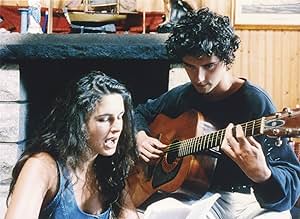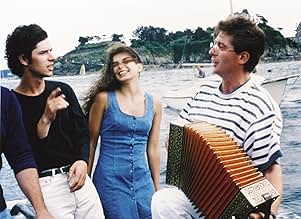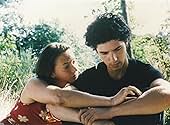IMDb-BEWERTUNG
7,6/10
11.156
IHRE BEWERTUNG
Füge eine Handlung in deiner Sprache hinzuAs a reserved young graduate vacations in a seaside town, he hopes his girlfriend will join him. But he ends up bonding with a local young woman whose female friend is also smitten with him.As a reserved young graduate vacations in a seaside town, he hopes his girlfriend will join him. But he ends up bonding with a local young woman whose female friend is also smitten with him.As a reserved young graduate vacations in a seaside town, he hopes his girlfriend will join him. But he ends up bonding with a local young woman whose female friend is also smitten with him.
- Auszeichnungen
- 1 Nominierung insgesamt
Empfohlene Bewertungen
Gaspard, played by Melvil Poupaud, is a song writer, a good-looking but
dull young man, a gauche loner with a flat voice and an inexpressive
face who comes to this delightful holiday island of Dinard off the
Brittany coast to await the arrival of his `sort-of' girl friend, who
demonstrates how much she loves him by keeping him waiting for two
weeks. During those two weeks, however, he finds two other girl friends
anything else. First he is picked up in a restaurant by Margot, a
waitress, who turns out not to be a waitress but an Ethnologist, just
helping out her aunt who owns the restaurant. Obviously such a bright
and intelligent girl could not be merely working-class!
Amanda Langlet, who plays Margot and who appeared ten years earlier in
Rohmer's `Pauline at the Beach.' is clearly the star of this film. Much
of the enjoyment of the film is derived from being in the company of
this vivacious girl and being allowed to eavesdrop on her talk with
Gaspard about love and relationships as they roam in the bright sunlight
around this lovely French sea-side resort and the countryside beyond.
She is such a very warm and sympathetic listener that it is difficult to
understand why he doesn't fall in love with her. Why she doesn't fall in
love with him is easier to understand. (you ask yourself; is this man a
very good actor or a very bad one?) He makes a couple of inept attempts
to move the relationship forward but is repulsed; she wants only
friendship - and you feel he is lucky to get that - while she awaits the
return of her Anthropologist boy-friend who is away in South America.
Gaspard's dullness is made obvious when she takes him to hear an old
sailor sing sea-shanties; her face so eager and enrapt as she listens
intently; his face, alongside, so lifeless.
She encourages him to take up with Solene, played by Gwenaelle Simon in
her first film, a friend of her's who they meet at a dance, but when he
does, she is jealous, jealous of their friendship she says but secretly
hurt that he now thinks of her as only a friend.
His relationship with Solene seems idyllic at first, they seem
marvelously happy and well suited to each other. He is accepted warmly
into her family, they all go sailing together and have a merry
sing-a-long to one of his songs. But then, sadly, her true nature shows;
she becomes aggressive and demanding, insisting that he take her to the
island of Quessant or their relationship is at an end. And now Lena, his
`sort-of' girl friend, played by Aurelia Nolin, appears and insists that
he take her instead. He must now choose.
Rohmer's films are never plot-dependent; he prefers to dwell on the
characters, to bring us into a close, intimate relation with them, while
they reveal themselves in talk. And when the characters are as
attractive as Margot
dull young man, a gauche loner with a flat voice and an inexpressive
face who comes to this delightful holiday island of Dinard off the
Brittany coast to await the arrival of his `sort-of' girl friend, who
demonstrates how much she loves him by keeping him waiting for two
weeks. During those two weeks, however, he finds two other girl friends
- or rather they find him. It must be his good-looks, it can't be
anything else. First he is picked up in a restaurant by Margot, a
waitress, who turns out not to be a waitress but an Ethnologist, just
helping out her aunt who owns the restaurant. Obviously such a bright
and intelligent girl could not be merely working-class!
Amanda Langlet, who plays Margot and who appeared ten years earlier in
Rohmer's `Pauline at the Beach.' is clearly the star of this film. Much
of the enjoyment of the film is derived from being in the company of
this vivacious girl and being allowed to eavesdrop on her talk with
Gaspard about love and relationships as they roam in the bright sunlight
around this lovely French sea-side resort and the countryside beyond.
She is such a very warm and sympathetic listener that it is difficult to
understand why he doesn't fall in love with her. Why she doesn't fall in
love with him is easier to understand. (you ask yourself; is this man a
very good actor or a very bad one?) He makes a couple of inept attempts
to move the relationship forward but is repulsed; she wants only
friendship - and you feel he is lucky to get that - while she awaits the
return of her Anthropologist boy-friend who is away in South America.
Gaspard's dullness is made obvious when she takes him to hear an old
sailor sing sea-shanties; her face so eager and enrapt as she listens
intently; his face, alongside, so lifeless.
She encourages him to take up with Solene, played by Gwenaelle Simon in
her first film, a friend of her's who they meet at a dance, but when he
does, she is jealous, jealous of their friendship she says but secretly
hurt that he now thinks of her as only a friend.
His relationship with Solene seems idyllic at first, they seem
marvelously happy and well suited to each other. He is accepted warmly
into her family, they all go sailing together and have a merry
sing-a-long to one of his songs. But then, sadly, her true nature shows;
she becomes aggressive and demanding, insisting that he take her to the
island of Quessant or their relationship is at an end. And now Lena, his
`sort-of' girl friend, played by Aurelia Nolin, appears and insists that
he take her instead. He must now choose.
Rohmer's films are never plot-dependent; he prefers to dwell on the
characters, to bring us into a close, intimate relation with them, while
they reveal themselves in talk. And when the characters are as
attractive as Margot
Eric Rohmer's characters are mostly intellectuals, and mostly not so bright. On one hand, this is to Rohmer's credit, since it's realistic; on the other hand, the rarer characters with more penetrating intelligence (as in, especially, "My Night at Maude's") are nicer to listen to. Rohmer's characters love to yak on about ideas, art, and their feelings. The talk, on the most literal level, is generally unpersuasive, but relationships are formed through enjoyment of conversation, and character (not limited to vanity) is revealed via defensiveness and posturing.
"A Summer's Tale" follows twenty-something Gaspard during his summer vacation at a seaside resort town in Brittany. The people in the movie have fewer blind spots than most Rohmer characters, but not fewer difficulties. For a theme song, I'd suggest Weird Al Yankovic's "Good Enough For Now." The girl Gaspard had planned to meet alternately blows him off and strings him along. Another girl he meets, with whom there is palpable chemistry, has a distant boyfriend she doesn't seem very attached to. He vacillates on a third he is not crazy about but who bluntly conveys that she would take him. Gaspard is turned down twice for a romantic relationship (though not told to get lost entirely), and does the turning down once.
The interactions exhibit a believable mixture of genuine affection, indecision, and awkwardness. Rough edges are not glossed over as they might be by romanticism or in recollection. These might have been ingredients for a dull virtuous accuracy. But "A Summer's Tale" moves at a good pace, turns in the story feel natural and mostly not inevitable, and the whole is affecting and memorable.
"A Summer's Tale" follows twenty-something Gaspard during his summer vacation at a seaside resort town in Brittany. The people in the movie have fewer blind spots than most Rohmer characters, but not fewer difficulties. For a theme song, I'd suggest Weird Al Yankovic's "Good Enough For Now." The girl Gaspard had planned to meet alternately blows him off and strings him along. Another girl he meets, with whom there is palpable chemistry, has a distant boyfriend she doesn't seem very attached to. He vacillates on a third he is not crazy about but who bluntly conveys that she would take him. Gaspard is turned down twice for a romantic relationship (though not told to get lost entirely), and does the turning down once.
The interactions exhibit a believable mixture of genuine affection, indecision, and awkwardness. Rough edges are not glossed over as they might be by romanticism or in recollection. These might have been ingredients for a dull virtuous accuracy. But "A Summer's Tale" moves at a good pace, turns in the story feel natural and mostly not inevitable, and the whole is affecting and memorable.
10aileigc
I'd say this film is an essay, regarding shyness, relations with the opposite sex, friendship and love. Being only based on the dialogues between different people, it's full of substance, and will definitely ask the viewer to think on the matter. I liked it so much because the people were real, the problem was real. Lots of people suffer problems of integration and self-achievement next to others and these have been thoroughly dealt with in the film.
Its main problems are how much is worth a summer romance next to a sincere friendship, and the importance of knowing exactly one's feelings and purposes (do I love her, or do I not ? Am I merely trying to have fun?).
In the end, we are faced with a line addressed to the main character that we can take for ourselves: "it was your own choice, think about it".
That's the main message: the director presents a problem, the dialogues delve deeply in several of its aspects but the conclusion of why things turned out as they did is left to us. In short, the viewer will certainly learn something from it, and that can even lead to deeper self-reflections on one's personal life. A valuable film, and an interesting lesson. Especially good for young people afraid of not finding that special one.
Its main problems are how much is worth a summer romance next to a sincere friendship, and the importance of knowing exactly one's feelings and purposes (do I love her, or do I not ? Am I merely trying to have fun?).
In the end, we are faced with a line addressed to the main character that we can take for ourselves: "it was your own choice, think about it".
That's the main message: the director presents a problem, the dialogues delve deeply in several of its aspects but the conclusion of why things turned out as they did is left to us. In short, the viewer will certainly learn something from it, and that can even lead to deeper self-reflections on one's personal life. A valuable film, and an interesting lesson. Especially good for young people afraid of not finding that special one.
10wobelix
First of all, let's say that Eric Rohmer deserves a 7 foot, solid gold Oscar, because he is one of the very last directors NOT to use Hollywood music. Or better: elevator muzak. He does not use music at all, unless someone within the story is singing or playing or listening.
No need here for external cues to explain to the viewer what's happening on screen. What a terrible shame Rohmer is the last to do so !!!
The cinematography of this SUMMER TALE flows magnificently, playing with the backdrop of beautiful Brittany. There are no hard or harsh cuts; no need for welding goggles to sit through this movie !
This is a small yet honest tale: the protagonists talk, rather than babble or throw comic book lines at each other.
A SUMMER'S TALE is not an epic, nor depicting a world changing event or some bigger than life humdrum. In all its subtlety and sincerity it is something that could happen to all of us.
Thank you Monsieur Eric Rohmer for yet another wonderful film.
No need here for external cues to explain to the viewer what's happening on screen. What a terrible shame Rohmer is the last to do so !!!
The cinematography of this SUMMER TALE flows magnificently, playing with the backdrop of beautiful Brittany. There are no hard or harsh cuts; no need for welding goggles to sit through this movie !
This is a small yet honest tale: the protagonists talk, rather than babble or throw comic book lines at each other.
A SUMMER'S TALE is not an epic, nor depicting a world changing event or some bigger than life humdrum. In all its subtlety and sincerity it is something that could happen to all of us.
Thank you Monsieur Eric Rohmer for yet another wonderful film.
A lovely little summer's love story. One guy, three girls, a stunning French coastal setting. He is in love, of course. With one of them? Two? All three? Himself?
It might not sound like much, but this movie is perfectly balanced. The illusion is flawless, with direction, photo, sound, everything so gentle that nothing intrudes on your enjoyment. And the actors are perfectly natural with the material. Excellent dialogue.
I especially like how fluid the presentation of Gaspard is. It keeps changing throughout the movie. We think we know who he is, what kind of person he is, and then we realize he's something else, different.
Also, the ending, great.
Overall, a beautiful little gem that also manages to pose a barrage of questions about love, without ever telling the audience what to think.
I need to watch more Rohmer movies.
It might not sound like much, but this movie is perfectly balanced. The illusion is flawless, with direction, photo, sound, everything so gentle that nothing intrudes on your enjoyment. And the actors are perfectly natural with the material. Excellent dialogue.
I especially like how fluid the presentation of Gaspard is. It keeps changing throughout the movie. We think we know who he is, what kind of person he is, and then we realize he's something else, different.
Also, the ending, great.
Overall, a beautiful little gem that also manages to pose a barrage of questions about love, without ever telling the audience what to think.
I need to watch more Rohmer movies.
Wusstest du schon
- WissenswertesThis is, perhaps, the film in which Rohmer - notoriously silent about his private life - came closest to autobiography, filling the story with discrete traces and allusions to his own past. "Of all the films I've made, I think this is the most personal vehicle. Everything that is in this film is true. They are either things that I experienced in my youth or things that I noticed. [...] I have carried with me the story of this film, which was in part inspired by events that occurred during my adolescence, for a long time."
- Antoine de Baecque & Noël Herpe, "Éric Rohmer: A Biography" (New York: Columbia University Press, 2016), p. 458.
- VerbindungenFeatured in The Movie Show: Folge vom 16. April 1997 (1997)
- SoundtracksFille de corsaire
Performed by Sebastien Erms
Top-Auswahl
Melde dich zum Bewerten an und greife auf die Watchlist für personalisierte Empfehlungen zu.
- How long is A Summer's Tale?Powered by Alexa
Details
- Erscheinungsdatum
- Herkunftsland
- Sprache
- Auch bekannt als
- A Summer's Tale
- Drehorte
- Rue de la Malouine, Dinard, Ille-et-Vilaine, Frankreich(Solene's cousins house)
- Produktionsfirmen
- Weitere beteiligte Unternehmen bei IMDbPro anzeigen
Box Office
- Bruttoertrag in den USA und Kanada
- 198.126 $
- Eröffnungswochenende in den USA und in Kanada
- 12.863 $
- 22. Juni 2014
- Weltweiter Bruttoertrag
- 198.706 $
- Laufzeit1 Stunde 53 Minuten
- Farbe
- Sound-Mix
Zu dieser Seite beitragen
Bearbeitung vorschlagen oder fehlenden Inhalt hinzufügen























